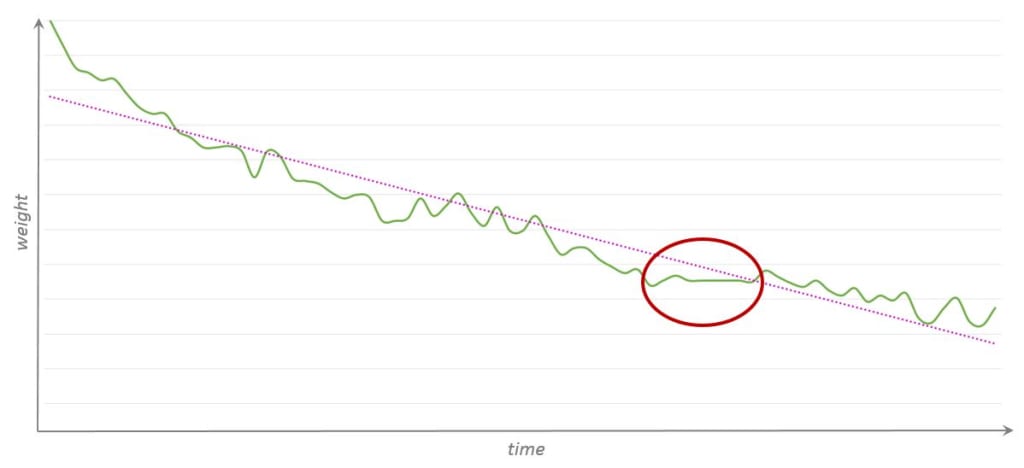How to Survive a Weight Loss Plateau
Understanding Why They Happen and How to Keep the Faith

If you follow any weight loss plan, there will come a point (usually more than one if you are on a significant journey) when your weight will suddenly, and inexplicably, stop going down no matter what you do. This is known as a weight loss plateau and it sucks.
Seeing your steady progress come to a sudden and unwarranted halt can feel very disheartening and it causes a lot of people to give up completely, thinking their plan is no longer working for them.
If this is you, then please don’t give up. Here’s what you need to know to survive a weight loss plateau:
1. Re-check your BMR.
Before you go any further, do a fresh check of your current BMR and ensure that your calorie intake is still creating an energy deficit. (If you are unsure how to do this, this article can help.)
As you lose weight, the amount of calories your body burns each day tends to lower (unless you have built considerable muscle mass) because the smaller a body is, the less energy it requires to move it around and keep it alive.
If you are eating the same number of calories per day as you did at the beginning of your weight loss journey, then over time the deficit between calories in vs. calories out will have become smaller and your weight loss will slow down as a result.
This should happen quite gradually, so if you have been losing weight steadily and it suddenly stops this is unlikely to be the reason why, however, it is still worth checking your calculations and adjusting accordingly at regular intervals.
2. Remember that weight loss is never linear.
It would be great if every 3,500 calorie deficit you saw another pound drop happily off the weighing scale, but unfortunately there are too many other factors at play.
The calorie deficit you have created through your diet causes a reduction of the volume of fat in the body (invariable a bit of muscle loss happens too). Whilst this should be a fairly steady reduction, it is not always best measured through weight.
A person's body weight can fluctuate massively day to day based on factors such as water levels, salt intake, the weight of food consumed, hormones and more. There could be a swing of as much as five pounds overnight but it is not possible to lose or gain five pounds of fat in that space of time.
Don't expect your loss to go steadily down and try not to freak out when it goes temporarily up. If you keep following your plan, it will come down again eventually (and often more weight goes with it when it does).
3. Understand why plateaus happen at all.
A halt in weight loss could happen for a number of reasons. One compelling theory is the "whoosh effect."
When fat is burnt up by the body, it is released from the cell that stores it. This cell doesn't disappear but merely collapses, ready to be filled again later on if needed. Because the body doesn't know how temporary this loss is, as an interim it fills the recently evacuated cell with water instead.
After a period of time of continued loss (could be a matter of a few weeks), the body will realise that the fat isn't coming back any time soon and releases the water, letting the cell collapse and go dormant.
This means that fat could be steadily burnt, but a person not only doesn't lose any weight for a week or two, but they may even get slightly heavier and feel bloated due to the retention of water. This can sometimes be detected by an almost squishy feeling in the body, as stored water is far less dense than fat.
You'll know when the whoosh is over by a sudden drop on the scales, an overnight feeling of lightness and generally, a lot of trips to the loo!
This can happen in cycles, so be patient, don't give up and wait for the big loss to happen.

4. Don’t make erratic changes.
Consistency is helpful when trying to lose weight. Getting into an exercise and eating rhythm can help cement a longer lasting change and it receiving a regular and predictable intake allows your body to be efficient. Mostly consistency helps you to learn what does and doesn't work for you.
If you panic when the scales don't move and start randomly trying out different methods, increasing and lowering your calorie intake each day, you won't know what is or isn't proving to be effective.
If you feel as though you need to make a change in your plan, it would be wise to adjust only one aspect, and stick with it for a number of weeks, before deciding if it is working for you or not.
If you are trying different things just to see the scales move quickly, try sticking to your plan but skipping a few weigh-ins instead. By the time you return to the scales, progress will hopefully be shown.
5. Track your weight loss progress more intermittently.
If you are someone who struggles to be pragmatic about weight fluctuations, it might prove more encouraging to weigh yourself less frequently.
Daily weigh-ins can cause a lot of frustration and often inadvertently put a spin on the way you approach eating that day. Common thoughts can include:
Weight goes down: "Yes! I've lost weight. I deserve this cookie..."
Weight goes up: "Why am I bothering? This cookie won't make any difference."
Weekly or even monthly weigh-ins will help you check your progress without such a regular impact on your thoughts.
6. Consider ditching the scales altogether.
It might be worth considering tracking your progress through a measurement other than weight to remove the stress of weight fluctuation altogether.
Instead, you could try taking measurements (hip, waist, and chest are good key indicators), taking photos (ensure you stand the same distance from the camera, hold the camera at the same height, and use consistent lighting), or use an item of clothing as a benchmark.
These all assure you that you are getting smaller which is the ultimate goal, weight is just one way of measuring it.
7. Keep the faith.
Whatever you do, don't give up.
You may feel frustrated when weight isn't moving at the speed you would like it to, but it is still moving a lot quicker than if you were to give up entirely.
Keep the faith. Keep going. You will get there in the end.
About the Creator
Rachel Roberts
A freelance writer from Coventry, England.
Loves meditation, Sunday afternoon's reading and walking her two whippets in the woods.






Comments
There are no comments for this story
Be the first to respond and start the conversation.